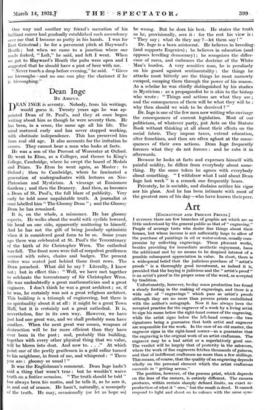Dean Inge
BY AMICUS.
DEAN INGE is seventy. Nobody, from his writings, - would guess it. Twenty years ago he was ap- pointed Dean of St. Paul's, and they at once began writing about him as though he were seventy then. He has been, in a sense, the same age all his life. The mind matured . early and has never stopped working, with obstinate independence. This has preserved him from real old age. It also accounts for the irritation he causes. They cannot bear a man who looks at facts.
He was a son of the Provost of Worcester at Oxford. He went to Eton, as a Colleger, and thence to King's College, Cambridge, where he swept the board of Medals and Prizes. To Eton he went again, as Master : to Oxford ; then to Cambridge, where he fascinated a generation of undergraduates with lectures on Neo- Platonism and Mysticism. A vicarage at Ennismore Gardens ; and then the Deanery. And then, as becomes a Dean of St. Paul's, the full blaze of publicity. Very early he told some unpalatable truth. A journalist at once labelled him " The Gloomy Dean " ; and the Gloomy Dean he has remained.
It is, on the whole, a misnomer. He has gloomy aspects. He walks about the world with eyelids lowered, his head on one side, apparently muttering to himself. And he has not the gift of being jocularly optimistic when it is considered good form to be so. Some years ago there was celebrated at St. Paul's the Tercentenary of the birth of Sir Christopher Wren. The cathedral was full. The front rows were full of corpulent gentlemen covered with robes, chains and badges. The present writer was seated just behind those front rows. The Dean preached. What did he say ? Literally, I know not ; but in effect this : " Well, we have met together to celebrate the tercentenary of Sir Christopher Wren. He was undoubtedly a great mathematician and a great engineer. I don't think he was a great architect ; or, if he was, he certainly was not a great religious architect. This building is a triumph of engineering, but there is no spirituality about it at all : it might be a great Town Hall,' but it is certainly not a great cathedral. It is, nevertheless, fine in its own way. However, we have just had one great war, and we shall probably soon have another. When the next great war comes, weapons of destruction will be far more efficient than they have ever been in the past ; and, probably this building, together with every other physical thing that we value, will be blown into dust. And now to. . . ." At which point one of the portly gentlemen in a gold collar turned to his neighbour, in front of me, and whispered : " There you 'are : gloomy as usual 1 " It was- the Englishman's comment. Dean Inge hadn't said a thing that wasn't true : but he wouldn't waive truth on a festive occasion. " The truth should be told " has always bezn-his motto, and he tells it, as he sees it, in and out of season. He hasn't, naturally, a' monopoly of the truth. He may, occasionally (or let us hope so) be wrong. But he does his best. He states the truth as he, provisionally, sees it : for the rest his view is : " They say ; what do they say ?—let them say f " Dr. Inge is a born aristocrat. He believes in breeding: (and supports Eugenics) ; he believes in education (and' opposes levelling democracy) ; he recognizes the differ- ence of races, and embraces the doctrine of the White Man's burden. A very sensitive man, he is peculiarly on his guard against sentimentality : the things he attacks most bitterly are the things he most narrowly escaped,. escaping them through the power of his reason. As a scholar he was chiefly distinguished by his studies in Mysticism : as a propagandist he is akin to the bishop- who wrote : " Things and actions are what they are ; and the consequences of them will be what they will be : why then should we wish to be deceived ? "
Dr. Inge is one of the few men now writing who envisage the consequences of current legislation. Most of our politicians, of whatever party, put Acts on the Statute Book without thinking at all about their effects on the social fabric. They impose taxes, extend education, alter franchises, and then are often aghast at the conse- quences of their own actions. Dean Inge frequently foresees what they do not foresee : and he rubs it in afterwards.
Because he looks at facts and expresses himself with painful' acidity, he differs from everybody about some- thing. By the same token he agrees with everybody about something. " I withdraw what I said about Dean Inge last week " is a remark one frequently hears.
Privately, he is sociable, and disdains neither his cigar nor his glass. And he has been intimate with most of the greatest men of his day—who have known their peer.























































 Previous page
Previous page